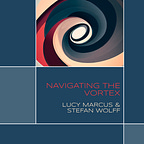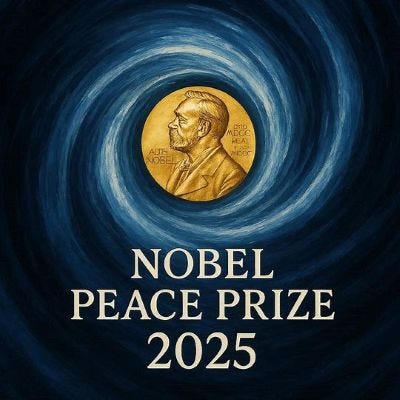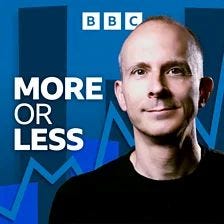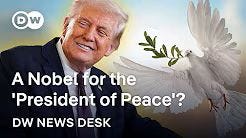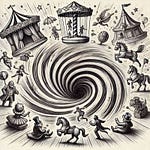And the winner is … not Donald Trump. This is probably going to be the enduring memory of the 2025 Nobel Peace Prize.
This year’s recipient is María Corina Machado, the leader of Venezuela’s opposition movement. The Norwegian Nobel committee awarded her the prize “for her tireless work promoting democratic rights for the people of Venezuela and for her struggle to achieve a just and peaceful transition from dictatorship to democracy”.
Machado’s efforts clearly are laudable, and she certainly deserves praise for her personal courage standing up to Venezuela’s strong-man ruler, Nicolas Maduro. Following the announcement of her award, Machado took to social media and dedicated her “prize to the suffering people of Venezuela and to President Trump for his decisive support of our cause!”
This, and her previous gratitude to Trump for targeting the Maduro regime, might explain why the reaction from the White House has been relatively uncombative. Trump himself reposted Machado’s tweet praising him as one of her opposition movement’s main allies.
Shortly afterwards, however, he could not help himself and thanked Russia’s president Vladimir Putin — a long-time supporter of the Venezuelan regime — for statements after the announcement of the award to Machado that questioned the Nobel prize committee’s choice and praised Trump’s peace-making efforts.
The choice of this year’s winner aside, the entire process surrounding the award has been highly unusual in the way that it has involved very public lobbying for a particular candidate and that candidate’s self-promotion.
Trump used every conceivable opportunity, including his speech before the UN general assembly on September 23, when he reiterated an earlier claim to have “solved seven wars”.
These claims have been widely called into question. And with good reason, as tenuous ceasefires are the closest that Trump got in some of the actual wars in which he intervened.
For more on the substance of Trump’s claims, listen to my interviews on:
This would not necessarily have ruled Trump out from the competition — the criteria do not require success but also allow for effort to be rewarded. Alfred Nobel’s 1895 will specified that the peace prize should go to “the person who shall have done the most or the best work for fraternity between nations, the abolition or reduction of standing armies and for the holding and promotion of peace congresses”.
Yet even if the Nobel committee had prioritised effort over accomplishment, Trump’s chances for success were remote, given that nominations annually close on January 31, which was barely a week into Trump’s second term. By then he had arguably played a role in a temporary ceasefire in the war in Gaza, but most of his subsequent claims had yet come to pass.
It is also questionable that Trump’s nominators did much to promote his cause. Pakistan’s Prime Minister, Shehbaz Sharif, and the country’s army chief Field Marshal Asim Munir, Israel’s prime minister, Benjamin Netanyahu, and Azerbaijan’s president, Ilham Aliyev, are unlikely to have had much, if any, influence on the Norwegian Nobel committee.
There have been controversial choices for the Nobel peace prize before.
Henry Kissinger won the prize in 1973 for ending the Vietnam war, together with Le Duc Tho, the principal Vietnamese negotiator who declined the prize. But while he negotiated the end of the war in Vietnam, he was, among other things, also notorious for a devastating bombing campaign against Cambodia from 1969 to 1973.
Ethiopian prime minister Abiy Ahmed Ali was awarded the 2019 prize “for his efforts to achieve peace and international cooperation, and in particular for his decisive initiative to resolve the border conflict with neighbouring Eritrea”. That, however, did not stop him from fighting a vicious civil war against the Tigray People’s Liberation Front which has cost the lives and livelihoods of hundreds of thousands of civilians.
Trump clearly would have looked better in comparison to Abiy and Kissinger. But compared to three past US presidents who won the prize — Theodore Roosevelt in 1906 for mediating an end to the Russo-Japanese war, Woodrow Wilson in 1919 for founding the League of Nations, and Jimmy Carter in 2002 for decades of work promoting peaceful conflict resolution, democracy, and human rights — his track record of success is shakier.
While he deserves some credit for his efforts and at least some temporary successes, Trump himself has no spotless track record as a peacemaker.
His eight months in office since he re-entered the White House for a second term in January 2025 are hardly an advertisement for “the person who shall have done the most or the best work for fraternity between nations, the abolition or reduction of standing armies and for the holding and promotion of peace congresses”, as required by the prize criteria.
Trump has threatened to annex Greenland, incorporate Canada as the 51st state into the US, joined Israel in bombing Iran during the so-called twelve-day war, and carried out a deadly campaign of airstrikes against alleged Venezuelan drug traffickers.
This mixture of peace-making and warmongering sets Trump apart from the fourth US president winning the prize — Barack Obama in 2009 “for efforts to strengthen international diplomacy and cooperation between peoples”. This, too, was a controversial choice at the time because it was mostly aspirational given Obama’s lack of a track record.
Perhaps the best outcome of the 2025 Nobel prize saga and the fact that Trump did not win might be that the US president now doubles down in his peace-making efforts.
He has gone on the record having ended seven wars and now has another potential success with the Gaza ceasefire deal. If he wants to remain in contention for the 2026 award, he can’t afford for his grandiose claims to be proven wrong.
And if he succeeds, even in preventing any of these conflicts from flaring up again, a service to peace will have been done and it shouldn’t matter that it was done by Trump or what his ultimate motivation was.
An earlier version of this analysis was published by The Conversation on October 10, 2025.
We hope you’ll share Navigating the Vortex with anyone you think might find it of interest. Also, you can listen to our podcast editions via the website and on all major podcast platforms, including:

